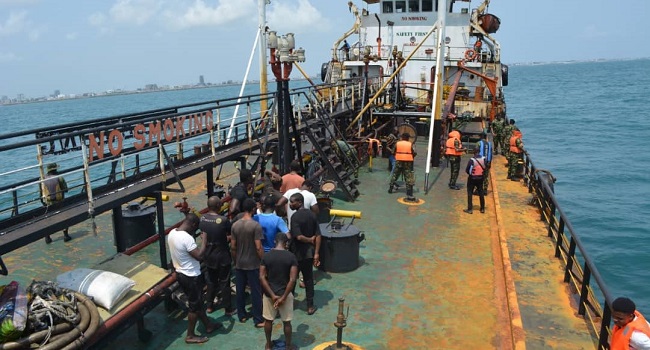A Director at Tantita Security Services, Warredi Enisuoh, has given some insights on why security operatives destroy most vessels that are caught stealing Nigeria’s crude oil.
Enisuoh, who spoke on Channels Television’s breakfast show The Morning Brief on Thursday, stated that various circumstances contributed to the decision to destroy the warships.
“Nobody is going to be very happy about the destruction of evidence, however, one of the problems we always find is that ships are not small assets. The moment they are apprehended, the first thing the owners try to do is to leave the country.
“So, you are now left with the evidence, you don’t have anybody to hold. The evidence contain oil, the oil will not stay within that metal for long because it is sitting in one place and it keeps polluting the environment, it’s a very big problem.
“This is couple with the fact that investigations and the legal process will take quite a while and as you know, oil won’t just sit there forever and guarding it is expensive,” Enisuoh said in an interview.
Tantita, a private security firm engaged by the Federal Government to secure important oil and gas facilities in the Niger Delta, is controlled by Government Ekpemupolo, a former Niger Delta agitator.
In recent months, the business has arrested a number of high-profile crude oil thieves in the Niger Delta.
When these vessels transporting stolen crude oil are apprehended, security personnel typically burn them on fire, which many have denounced as the destruction of evidence that could have been used to prosecute the offenders.
The Tantita director, however, stated that the amount of destruction of seized vessels has decreased, and that the legal approach is now more widely accepted.
“The court approach is now being taken and it is yielding results, so let’s see how it goes,” he said.
Enisuoh also said that the policy of keeping such evidence needs to be reviewed so that the organisation keeping the evidence won’t be overwhelmed.
Crude oil theft has remained one of the key issues hurting the country’s economy because it diminishes the country’s oil supplies, cutting off its main source of revenue.
The federal government has made some measures to combat this danger, such as establishing committees on crude oil theft and management, but the problem continues to drain the nation’s resources.



